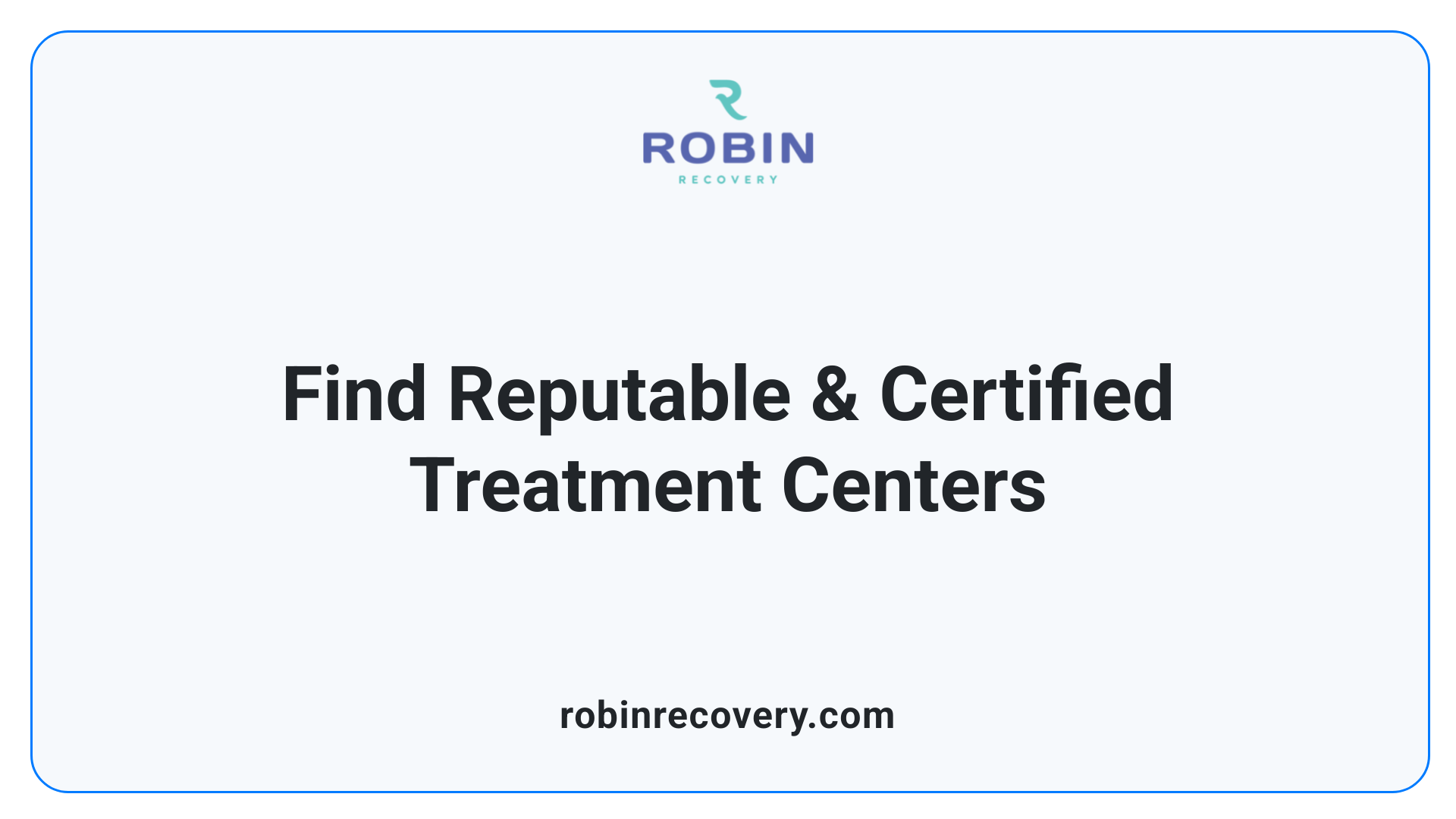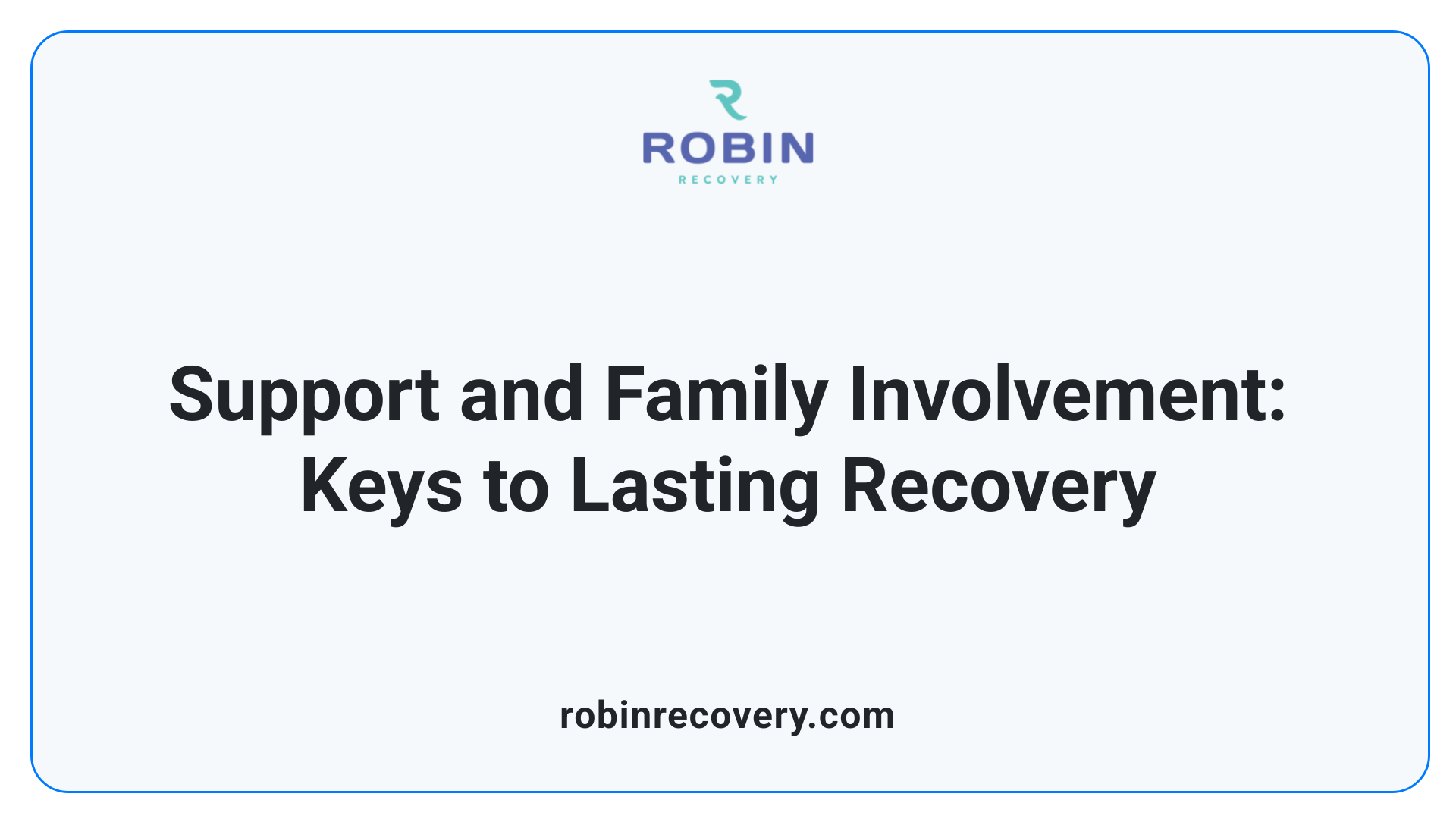How to Choose the Right Treatment Program for Addiction Recovery

Understanding the Foundations of Choosing a Treatment Program
Finding the right addiction treatment program is a crucial step toward achieving lasting recovery. The process involves evaluating various options, understanding different treatment approaches, and selecting a facility that aligns with individual needs, preferences, and circumstances. Given the diversity of programs available—from inpatient rehab to outpatient services—making an informed decision can significantly influence treatment success. This article explores how to navigate this complex landscape, emphasizing the importance of personalized care, evidence-based practices, and reliable resources.
Assess Your Personal Needs and Define Recovery Goals

When seeking addiction treatment, understanding your personal situation is the first step toward effective recovery. Start by identifying the substance involved in your addiction, whether it's alcohol, opioids, or other drugs. Recognizing which substance is at the core of your addiction helps determine the most appropriate treatment approaches.
Next, consider any underlying issues that might impact your recovery, such as co-occurring mental health disorders like depression or anxiety. Addressing these conditions alongside substance use is vital for a successful outcome.
Evaluating the severity of your addiction is also crucial. Is your use mild, moderate, or severe? The level of severity influences the type and intensity of treatment needed, ranging from outpatient programs to full inpatient rehabilitation.
Setting clear personal recovery goals will guide your journey. Do you aim for complete abstinence, improved mental health, or better social and occupational functioning? Your goals help shape your treatment plan and keep you motivated.
How do I choose the right addiction treatment program?
To select the most suitable program, start by defining what you want to achieve with treatment. Assess your needs including the substance involved and any underlying mental health conditions. Research different levels of care—such as inpatient, outpatient, or partial hospitalization—and consider programs that cater to your specific addiction type or demographic, like women-only or youth-focused facilities.
Evaluate each option based on accreditation, staff credentials, and the evidence-based treatments they offer, like cognitive-behavioral therapy or medication-assisted therapy. Success rates and patient reviews can provide additional insight.
Practical factors such as cost, insurance acceptance, location, amenities, and program duration are also important. Many resources, including the SAMHSA helpline or online treatment locators like FindTreatment.gov, can help match you with programs aligned with your needs.
Ultimately, personalized treatment planning increases the chances of a successful and sustainable recovery, making thorough research and honest self-assessment essential in your decision-making process.
Explore Available Treatment Levels and Modalities

What are the different treatment approaches for addiction, and which is most effective?
Addiction treatment employs various approaches tailored to individual needs and the severity of substance use disorder. Evidence-based therapies such as Cognitive-Behavioral Therapy (CBT) help individuals identify and change negative thought patterns linked to substance use. Motivational Interviewing is used to enhance motivation for change, while Family Therapy involves loved ones in the recovery process to improve outcomes.
Participation in mutual support groups, like Alcoholics Anonymous (AA) or Narcotics Anonymous (NA), provides ongoing peer support which can sustain long-term sobriety.
Other therapeutic modalities include Dialectical Behavior Therapy (DBT), designed to manage emotions and reduce relapse risk, and experiential therapies like psychodrama or Eye Movement Desensitization and Reprocessing (EMDR) that help process trauma-related triggers.
The most effective treatment combines multiple methods, customized to the individual's unique circumstances. For example, incorporating family therapy and psychological counseling has proven beneficial, especially for co-occurring mental health conditions.
In clinical practice, evidence-based therapies such as CBT are often regarded as highly effective for reducing substance use, preventing relapse, and teaching coping mechanisms. The choice of treatment should follow a thorough assessment by a healthcare professional, considering the individual's background, preferences, and specific needs.
Understanding the different treatment modalities can help individuals and families make informed decisions, thereby increasing the chances of successful recovery.
Overview Table of Treatment Modalities
Treatment Approach Description Effectiveness & Use Cases Inpatient Residential Programs 24-hour care in a live-in facility, intensive support Best for severe addiction or detox needs; high success rates Outpatient Programs Treatment while living at home, flexible scheduling Suitable for milder cases or ongoing recovery needs Partial Hospitalization (PHP) 20+ hours/week treatment, close medical supervision Intensive treatment for those transitioning from detox or inpatient care Intensive Outpatient (IOP) 9-20 hours/week; therapy and intervention sessions Suitable for mild to moderate cases, or as step-down care Medical Detoxification Supervised withdrawal in a hospital or clinic Essential for severe withdrawal symptoms; often precedes therapy Evidence-Based Therapies CBT, Motivational Interviewing, Family Therapy Proven to reduce relapse risk and teach coping skills
These treatment options are part of a comprehensive plan that ideally includes ongoing support after initial treatment, such as relapse prevention and community resources. Selecting the appropriate level of care depends on severity, personal circumstances, and medical recommendations. Accreditation, staff qualifications, and evidence-based practices are essential considerations when choosing a facility.
Search Tip
For more information, search "Levels and modalities of addiction treatment" to explore detailed guidelines and local options.
Evaluate Treatment Facilities for Quality and Credibility

What criteria should I look for to assess the quality of a rehab facility?
When choosing a rehab program, assessing its quality and credibility is essential to ensure effective treatment. Start by checking whether the facility is accredited by recognized organizations like the Commission on Accreditation of Rehabilitation Facilities (CARF) or The Joint Commission. These accreditations indicate that the center meets established standards for safety, treatment quality, and staff qualifications.
Next, evaluate the qualifications and experience of the staff. Look for licensed professionals such as physicians, counselors, and therapists with specialized training in addiction treatment. The presence of multidisciplinary teams—including medical doctors, mental health specialists, and addiction counselors—can greatly enhance care quality.
The environment should be clean, safe, and welcoming. Facilities that prioritize hygiene and comfort often indicate a commitment to patient well-being. Don't hesitate to visit the center in person if possible, to observe the cleanliness, safety measures, and the responsiveness of staff.
Treatment protocols should be evidence-based and tailored to individual needs. Request information about how personalized care plans are developed, how treatment progress is monitored, and how discharge and post-treatment support are planned.
Finally, read reviews and testimonials from former patients. Positive feedback, along with a transparent history of success rates and available support services, provide insight into the facility’s effectiveness. If possible, visiting the site allows you to ask questions directly and assess whether the environment aligns with your comfort and recovery needs.
Criterion Focus Area Additional Details Accreditation Quality standards CARF, The Joint Commission Staff Qualifications Expertise & licenses Trained addiction specialists, licensed therapists Environment Cleanliness & safety Well-maintained, safe, welcoming Treatment Approach Personalized care Evidence-based, tailored to individual needs Patient Feedback Reputation Reviews, testimonials, visit if possible
Select an Appropriate Treatment Approach Based on Individual Needs

When choosing a drug treatment program, personal preferences and individual circumstances play a crucial role in selecting the right approach. It is important to consider whether the individual prefers inpatient or outpatient care, which can depend on the severity of their addiction, living situation, and personal comfort. Cultural considerations, including language, beliefs, and community support, should also influence the choice to ensure the treatment feels respectful and accessible.
Specialized programs tailored for specific demographics, such as veterans or pregnant women, enhance the likelihood of success. For example, programs for pregnant women focus on safer treatment methods for both mother and baby, while veteran-specific services often address trauma-related issues.
Addressing co-occurring mental health disorders is vital, as dual diagnosis treatment integrates care for mental health and substance use disorders simultaneously, increasing overall effectiveness.
Many treatment programs incorporate the use of medications—such as those used in Medication Assisted Treatment (MAT)—which combine FDA-approved drugs with therapy. MAT has proven particularly effective for opioid and alcohol use disorders, reducing relapse rates and supporting long-term recovery.
In addition to medical and psychological therapies, holistic activities like mindfulness, art therapy, or yoga can support emotional healing. It’s essential to evaluate the program’s credentials, staff qualifications, and whether it offers a continuum of care that includes follow-up support.
Taking these factors into account helps ensure that the selected treatment aligns with the individual's unique needs, preferences, and cultural background, thereby increasing the chances of successful recovery.
Identify Factors Indicating a Reputable and Effective Treatment Facility
When searching for an addiction treatment program, it's crucial to consider several attributes that indicate quality and reliability. First and foremost, verify that the facility is properly licensed and accredited by recognized organizations like The Joint Commission or the Commission on Accreditation of Rehabilitation Facilities (CARF). These endorsements ensure that the program meets rigorous standards of care, safety, and professionalism.
Understanding the program's success rates and outcome measures offers insight into its effectiveness. Reputable centers often publish or provide data on their treatment outcomes, including relapse rates, client satisfaction, and long-term recovery statistics, helping you gauge their track record.
Staff credentials and specialization are equally important. Look for facilities staffed by licensed professionals such as Licensed Alcohol and Drug Counselors (LADC), Licensed Professional Counselors (LPC), or psychiatrists with experience in addiction medicine. Centers that have staff with particular expertise in treating co-occurring mental health disorders or specific populations (e.g., adolescents, pregnant women) tend to provide more tailored and effective care.
Moreover, ensure the facility employs evidence-based practices, including cognitive-behavioral therapy (CBT), motivational interviewing, and approved medications like methadone or buprenorphine for opioid use disorders. The use of scientifically supported treatments enhances the likelihood of successful recovery.
Patient feedback and reviews can also inform your decision. Hearing from former or current patients about their experiences helps assess the center's environment, staff engagement, and overall effectiveness.
How do I choose the right addiction treatment program?
To select the best program, establish your recovery objectives and identify your specific needs, such as the substance involved, mental health considerations, and any social or medical issues. Research different levels of care—whether inpatient, outpatient, or partial hospitalization—and look for facilities with specialized services for your particular circumstances.
Evaluate accreditation and licensing thoroughly, and ask about the qualifications and experience of the clinical staff. Prioritize programs that use proven therapies and medications supported by current research.
Cost, insurance acceptance, location, amenities, and program duration are practical aspects to consider. Finally, utilize reputable resources such as the SAMHSA helpline or online treatment locators to compare options and make an informed choice.
Understanding these key factors helps ensure that the chosen treatment center provides reliable, effective, and personalized care, increasing the chances of a successful recovery journey.
Understand the Role of Family and Support Systems in Recovery

What should I consider when choosing a drug treatment program?
When selecting a drug treatment program, involving family and support systems can significantly enhance recovery success. Effective programs often include family involvement in treatment and aftercare, recognizing that a strong support system aids long-term sobriety.
Family therapy sessions are integral, providing a safe space to address dynamics that may influence substance use, improve communication, and foster understanding. These sessions help family members learn how to support their loved one's recovery while managing their own emotional responses.
Support groups specifically for families, such as Al-Anon or Nar-Anon, are valuable resources offering shared experiences, education, and emotional support. They equip families with skills to navigate challenges and sustain a recovery-supportive environment.
Building a recovery-supportive environment extends beyond therapy; it involves creating a safe, healthy, and encouraging home setting. This includes minimizing triggers, establishing routines, and encouraging participation in ongoing support groups.
Choosing an accredited facility with a holistic team—comprising medical, psychological, and social support professionals—is essential. The program should offer evidence-based therapies like cognitive-behavioral therapy and include follow-up support after treatment ends.
By prioritizing family involvement and a comprehensive support structure, individuals in recovery are more likely to sustain their progress and achieve long-term sobriety.
Empowerment Through Knowledge in Recovery Choice
Choosing the right addiction treatment program is a vital and personalized process that benefits from comprehensive research, professional guidance, and honest assessment of your needs. Utilizing credible resources such as SAMHSA's helpline and treatment locator tools can simplify the process, and understanding various treatment options ensures you select a program that offers evidence-based therapies, licensed staff, and supportive environments. Remember, effective addiction recovery is rooted in tailored care, ongoing support, and active participation by individuals and their support networks. By making informed decisions, you set the foundation for a successful journey toward recovery, health, and renewed life.
References
- National Helpline for Mental Health, Drug, Alcohol Issues - SAMHSA
- How Do I Choose The Right Rehab? - Addiction Center
- FindTreatment.gov: Home
- Chapter 5—Specialized Substance Abuse Treatment Programs - NCBI
- How Do I Choose The Right Rehab? - American Addiction Centers
- 12-Step or Non 12-Step Recovery Programs: Which Is Right for You?
- How to Choose the Right Place for Alcohol or Drug Rehab - WebMD
- What to Consider When Choosing an Addiction Treatment Program
